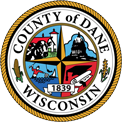SECOND CONSECUTIVE CLEAN AIR ACTION DAY CALLED FOR TUESDAY, JULY 12TH
July 11, 2005
Dave Merritt, Project Coordinator
(608) 266-9063
County Executive
The Dane County Clean Air Coalition (CAC) today announced the second consecutive Clean Air Action Day for Tuesday, July 12th. It will be the third Clean Air Action Day of the summer ozone season. A Clean Air Action Day lets people know that the ozone could reach an unhealthy level especially for children, older adults, people with asthma and adults engaged in vigorous outdoor activities. Clean Air Action Days also remind people of simple actions they can take to improve the air we all breathe.
“It is forecast that the remnants of Hurricane Dennis will not arrive in time to save us from a second consecutive Clean Air Action Day,” said Dave Merritt, Project Coordinator of the CAC. According to Merritt, Wisconsin Department of Natural Resources (DNR) weather forecasters believe that the clouds and rain from Hurricane Dennis will not make their way into Dane County on Tuesday.
During today and tomorrow’s Clean Air Action Day, government agencies, businesses and citizens will be asked to do their share for cleaner air and the health of local residents by engaging in ozone-reducing activities. CAC organizations will activate their Clean Air Action Day response plans to help protect air quality and help ensure that Dane County continues to comply with all federal air quality standards.
Madison Metro will again tomorrow provide free bus service to encourage people to leave their cars at home. Clean Air Action Day response plans include alerting all employees via e-mail, limiting vehicle idling and avoiding refueling fleet vehicles until after 6 p.m., reducing or postponing mowing and painting whenever possible and conserving energy by reducing air conditioning and lighting.
-MORE-
Dane County Clean Air Coalition – Page 2
A Clean Air Action Day is called when Department of Natural Resources meteorologists notify the CAC that weather conditions may produce high levels of ozone on the following day. Clean Air Action Days occur on hot days with lots of sun and little or no wind when pollutants “cook” in the hot sunlight to form ground-level ozone. Nearly one-half of Dane County’s ozone-
causing pollutants come from our cars and trucks, as well as other gasoline and diesel engines that power everything from construction equipment to lawn mowers. Power plants burning fossil fuels and smaller businesses that use ozone-generating materials such as paints and solvents also contribute to the problem.
The Dane County Clean Air Coalition is a private/public partnership of businesses, schools, government agencies and citizens working together to voluntarily reduce air pollution, keep our air healthy and help ensure that Dane County continues to meet state and federal air quality standards.
“Ozone hurts our health and ozone hurts our economy, “ said Merritt. “Ground-level ozone can cause coughing and wheezing and be especially hazardous to people with asthma. Recent health statistics estimate that approximately 40,000 Dane County residents, or 11% of our citizens, suffer from asthma. If Dane County were to exceed federal air pollution standards, it would mean the burden of mandatory regulations to reduce air pollution that could cost citizens and businesses millions of dollars.”
Actions that citizens can take on a Clean Air Action Day to reduce the likelihood of ozone formation include:
· Carpool, walk, bike or ride the free Madison Metro bus to work
· Reschedule or delay lawn mowing using gas-powered equipment until after 6 p.m.
· Refuel your car after 6 p.m., don’t overfill or top-off the tank and avoid idling
· Reduce the use of air conditioning and lighting
For more information on Clean Air Action Days, visit the Dane County Clean Air Coalition website at www.cleanairdane.org.
# # #
Dane County Clean Air Coalition Members: City of Madison, Dane County, Greater Madison Chamber of Commerce, Kraft Foods, Madison Area Metropolitan Planning Organization, Madison Gas & Electric Company, Madison Metropolitan School District, Petroleum Marketers Association of Wisconsin, University of Wisconsin-Madison, Wisconsin Department of Administration, Wisconsin Department of Natural Resources, Wisconsin Petroleum Council and the Wisconsin Department of Health and Family Services.
